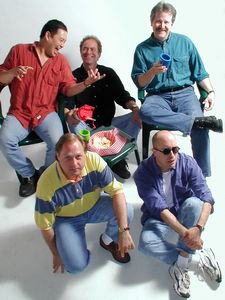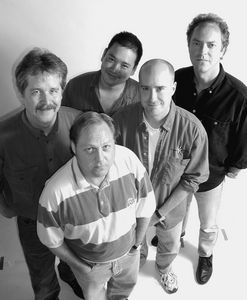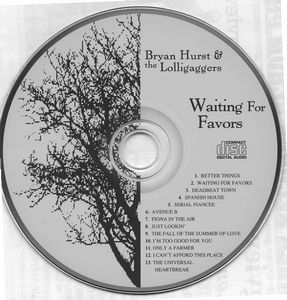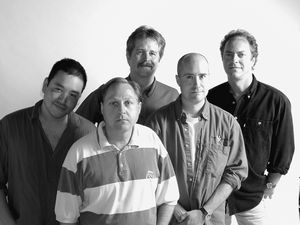social bookmarking tools:
 |
|
| Available RSS Feeds |
|---|
 - Top Picks - Top Picks |
 - Today's Music - Today's Music |
 - Editor's Blog - Editor's Blog
|
 - Articles - Articles
|
Add Louisville Music News' RSS Feed to Your Yahoo!
|

Waiting No Longer:
Bryan Hurst And The Lolligaggers
By Tim Roberts
A lonely pair of traffic lights slowly flashed yellow to an empty street. For about a mile on either side, flimsy orange mesh fencing - sagging or trampled in places - contained the weedy remnants of the Louisville neighborhood once known as Highland Park. NO TRESPASSING signs punctuated the center of each limp span of fence. What was once a self-sustaining neighborhood with small homes, a business district, churches and a school was now hills of broken concrete and dirt amid patches of tall grass. All purchased by the city and razed for airport expansion.
The irony is that a majority of Highland Park's early residents toiled for the Louisville & Nashville Railroad, which operated nearby. The CSX Corporation absorbed L&N in a merger sixteen years ago. The trains were parked on Strawberry Lane, less than a mile southwest of the neighborhood. The repair depot was a short walk north on Floyd Street. Then the airport moved in. Almost fifty years later, Highland Park was gone.
Highland Park was a tidy rectangular area bordered at its north end by the Watterson Expressway, by Beechmont neighborhood on the west, and on the east by Crittenden Drive and the Louisville International Airport. A spread of other businesses once lay south of it: an International Harvester plant, a grocery distribution warehouse, a lumber processing mill, a welding service, all close by to provide work for the neighborhood's blue-collar inhabitants.
A light wind swayed the pair of traffic lights that hung at the intersection of Hiawatha Avenue and Park Boulevard, a pocked strip of concrete that runs parallel to the existing set of CSX railroad tracks. Several other streets that once bisected Park and ran east-west from Crittenden Drive to the Beechmont neighborhood also took names from Native American tribes or terminology: Dakota, Wampum, Seneca, Saginaw, Chicopee, Wabaso. The singularly odd name of the set is Southern Heights.

Thirty-seven-year-old Louisville singer-songwriter Bryan Hurst read a story in The Courier-Journal about a woman who lived in Highland Park, who woke up one morning and found her street name had changed overnight from Erie Avenue to Southern Heights. For a reason known only to time, the city extended Southern Heights southeast, from its originating neighborhood of Taylor-Berry, further west of Highland Park, to the airport. Bryan then culled a song from that woman's story: "I Went to Sleep on Erie," a tribute to the place that was Highland Park, a reflection on abrupt, confusing change. A gentle dirge on the destruction of distinct, self-sustaining neighborhoods that collectively make up Louisville.
In a March performance of Bryan with his band the Lolligaggers at the Rudyard Kipling, a young dark-haired woman collecting the cover charge told me his music is connected to the city as deeply as many of Bruce Springsteen's are to his home state of New Jersey. In Waiting for Favors, the debut release from Bryan Hurst and the Lolligaggers (reviewed in the February LMN), that local connection is in three of the 13 selections, which are, either directly or peripherally, about people, events and places in Louisville: razzing a popular, frequently crowded nightspot in "I Can't Afford This Place" (and "Another Night in the Commodities Exchange," which is not on the CD); the cozy, diverse community of the Highlands in "Avenue B"; the summer's soup-thick humidity and flags flying half-mast after the death of Bill Dopp, who was Presto the Magic Clown on a local TV kids-show, in "Deadbeat Town." The lament for Highland Park in "I Went to Sleep on Erie" is also missing from the CD.
Bryan summarily declines the comparison to himself and Springsteen. "I don't there's as much of the Kentucky thing going on with me there is with Tim Krekel. He's better at that."
Tim Krekel is another Louisville singer-songwriter with a roots-y sound similar to Bryan's, but while Krekel's style nods toward rhythm-and-blues hooks, Bryan's edges toward country and folk. It's what the current crop of Nashville big-hat-and-belt-buckle clones might sound like if they decided to quit shoveling out hits and concentrated on songcrafting.

That similarity of sound isn't just because both front-men write songs about real people and real feelings, like the confusion of waking up in the same house but on a different street, or getting mercilessly dumped by a fiancé after you hock your guitar for an engagement ring, or a coca-plant farmer in Central America pleading with authorities not to burn his fields while pointing out the hypocrisy of government tobacco subsidies. It also helps to have two members of Tim Krekel's band, the Groovebillies, as part of the Lolligaggers: bassist Jim Baugher and violinist/mandolinist Peter Rhee. Completing the current Lolligagger roster is Butch Morgan on lead guitar and Woody Jerman on drums (Gene Wickliffe of The Mudcat Blues Band was the drummer for several tracks on Waiting).
Though it is missing from Waiting, "I Went to Sleep on Erie" is the best example of Lolligaggering, where Truth in Songwriting is folded into Melodies with Guts. Lyrically, the song is structured as a blues. The first line of each verse is repeated twice, then the third line contains the punch that, if played as a blues in a bar packed with rowdies, would be answered by "whoa-yeahs" and howls. Wrapped in the tender melody from the Lolligaggers, most notably Peter Rhee's sad violin, it takes on a reflective, empathetic tone. It haunts you as you scope mounds of crumbled concrete and weeds next to the airport.
The package of sound and words called Bryan Hurst and the Lolligaggers came about partly through acquaintances that have endured over two decades, but mostly through the collaboration on Waiting. "We started the album project before we actually had a band," Bryan explained.
We were in the basement of the home of producer/operator/engineer Jeff Carpenter and his wife Mary Kennedy, where Waiting was recorded and mixed. Jeff had converted it into Al Fresco's Place Studios (officially d.b.a. as Reel to Real Studios), co-opting Alfresco Place, the name of the street where the studio is located. Joining us were remaining Lolligaggers Butch Morgan, Jim Baugher, and Peter Rhee. Drummer Woody Jerman was elsewhere. Jeff and Mary's son Declan, two-and-a-half years old, blonde and wiggly, properly ignored the grown-ups.
Slender with a steady gaze and a Marine boot-camp haircut, Bryan sat relaxed with his legs crossed, describing how the Lolligaggers came together.
"The band came ready made," he said when asked why he borrowed musicians from another group. "We started the album project before we actually had a band. Jeff got Jim and Gene Wickliffe, who had both been the Al Fresco house rhythm section for a lot of studio projects here. Butch and I had already been talking about recording --"
"We had met at Dedden's [Highland Pub]," Butch said.

"-and Butch and I had actually known each other for at least 15 years. This is really the first time we've worked together. And I wanted some fiddle, so we called Peter, `cause who the hell else are you gonna call? We didn't start thinking about having a live band until after the album was in the can."
"Bryan did it the hard way," Jeff said. "Usually you have a band first then you make a CD. He's done it backwards, so it's gonna take awhile to build a following."
"As far as having a permanent lineup," Bryan continued, "we weren't sure. Gene's too busy with other bands to do that. Jim graciously plays whenever he can. We kind of lucked into Woody. He had come into the studio to work with [another band]. I liked his drumming a lot and asked him if he was available. And in his rather laid back way, he said, `Yeah, sure'."
In addition to the core group of musicians who recorded Waiting, a number of other local (and not-so-local) talent helped to create the Lolligagger sound heard on it: Laura Shine on backing vocals, drummer David Marasco on four selections, head Groovebilly Tim Krekel, Morris Ledet (husband of Rosie Ledet, the Zydeco Sweetheart) on accordion, David Barrickman lending concise piano and Hammond organ work, saxophonist Michael Murphy, and Randy Shipley on pedal steel guitar.
Two other Louisville music fixtures joined Bryan to create and market the CD: Co-producer Jeff Carpenter and Executive Producer John Timmons, founder of ear X-tacy music store, who put the CD on his ear X-tacy Records label.
"Jeff and I had worked together off and on for about 20 years, from back when I was in a punk rock band called Strychnine [at Waggener] high school," Bryan said. Which was also when he was a classmate with Louisville-native singer Joan Osborne, with whom he was a National Merit Scholarship finalist.
"[Waiting] was the first time we had done anything in awhile. Jeff was very gracious in saying, `let's just do it right and not worry about money right now.' So I'm now his indentured servant working off my debt."
Jeff laughed. "Actually, Bryan's become a sub-contracted assistant engineer and coffee-maker."
"So since we had that cushion of not worrying about money, we took our time to get it right. We spent a lot of time on mixing all the parts."
After the mix came the artwork from Tom Willis of the image factory. Willis' cover work has Bryan sitting on a chair, his arms folded over its back, his Husky named Indy at his feet. The land around him is barren except for an anorexic tree and a skinny ribbon of highway stabbing back into the distance. It's based on the title track, "Waiting for Favors," an abstract of Bryan's years as a musician, struggling to gain recognition in a city and industry full of performers who, in the song, "started out by annoying all the neighbors." For a song that complains about less-deserving acts choking the spotlight, it lacks gratuitous whining. Instead, it is grounded in a muscular country vibe that defies self-pity, defiance made clear in the last line of the final verse: ". . .you're gonna have to listen to me this time."
Thanks to Executive Producer John Timmons and his ear X-tacy Records label, more people may have that chance.
"He was very happy the way [Waiting for Favors] turned out," Bryan said. "I think he's taken a more active interest in this one than some of the other CDs ear X-tacy has released." He chuckled. "Probably because I'm such a bad businessperson that I need help from him. [John] always says it's a great CD. We just need to figure out how to sell more of it.
So how are sales?
"For a local release," Bryan continued, "sales have been pretty good. John is fairly happy with it. We have not sold what we need to sell for him to make back his investment. But that's not a big deal. We will eventually."
"John's been pretty amazing," Jim Baugher added. "For a guy who's as busy as he is, who has a lot of other things to do besides producing, he's showing up a gigs selling CDs during the breaks like someone making four dollars an hour."
Sales of Waiting are mostly from the store since there are few gigs for the Lolligaggers. Other band members have their own musical commitments. "We don't play out as much as we probably should," Bryan said.
Once a gig is booked, then an audience needs to show up. Butch said, "It seems like when we promote and try to get people to come, we don't have that good of a turnout. But when we don't try at all, it's different."
"It's a fickle crowd here in Louisville," Bryan added. "I think that's true for almost everybody. There's more good original music now in Louisville than there has been in a long time, but I don't think there's the centralized scene we had ten years ago with places like Tweligan's Tavern."
"There's good recording going on here [in Louisville]," Jim said, "and some really good musicians. There just are not a lot of places to play."
"It's a lot harder to sell yourself," Peter stated, "when you've got the more acoustic side of alternative music that attracts the 16-to-24 crowd, then there's us, then there's the mature, `I-don't-know-your-songs-but-I'll-give-you-a-chance' audience."
"This is a big community," Bryan said. "There are plenty of people that go out and listen to music. I just haven't figured out how to get them into places where we're playing."
"You also have to look at who buys the most CDs: younger people."
Bryan flashed on a solution. He addressed the band. "I'm gonna fire you guys and hire a bunch of 15-year-olds."
Bryan Hurst and the Lolligaggers (either the middle-aged or 15-year-old version, not yet determined at press time) will be waiting for you at a pair of timely appearances in both major music festivals in Louisville this summer.
June 4 - The Powertel Rockin' at Riverpoints Concert Series on the Great Lawn at Waterfront Park, starting at 6 p.m. They will be the opening band, followed by Peace in the Jones and Inner Circle.
June 11 & 12 - The Hideaway Saloon, 10 p.m. to 2 a.m.
June 26 - City Stage, the showcase exclusively for Louisville-area musicians on the Belvedere, as the headlining act performing from 9:30 to 11 p.m..
Bryan Hurst and the Lolligaggers invite you to visit their website at http://members.iglou.com/bhurst.
Author's Note: I want to thank the Regional Airport Authority for Louisville and Jefferson County allowing me to trespass on their acquisition for a few minutes while I scribbled three pages of hasty notes; my father, S. L. Roberts, a former L&N employee, for providing a tidbit of information about the railyards; and Bryan Hurst for answering via email and telephone a handful of questions I forgot to ask.
This is for Ayesheh and the ghosts of crisp autumn nights from long ago.
". . .and I never saw her again."
Raymond Chandler
The Big Sleep
